|
Word Gems
exploring self-realization, sacred personhood, and full humanity
Ultimate Reality
Viktor Frankl, Man's Search for Meaning: recounting an Auschwitz experience: "We stumbled on in the darkness, over big stones and through large puddles, along the one road running through the camp. The accompanying guards kept shouting at us and driving us with the butts of their rifles... But my mind clung to my wife's image, imagining it with an uncanny acuteness. I heard her answering me, saw her smile, her frank and encouraging look... for the first time in my life I saw the truth as it is set into song by so many poets, proclaimed as the final wisdom by so many thinkers. The truth - that love is the ultimate and the highest goal to which man can aspire. Then I grasped the meaning of the greatest secret that human poetry and human thought and belief have to impart: The salvation of man is through love and in love. I understood how a man who has nothing left in this world may still know bliss, be it only for a brief moment, in the contemplation of his beloved... I resumed talk with my loved one: I asked her questions, and she answered; she questioned me in return, and I answered."
Editor's Essay: What We Stay Alive For
Elizabeth’s Barrett's letter to Robert Browning, February 24, 1846: "I am living for you now. And before I knew you, what was I and where? What was the world to me … and the meaning of life?"
Editor's Essay: Jesus' parable of the mustard seed and the kingdom of God: smallest beginnings to eventually fill the cosmos
Hope, Faith, Love: the traditional cardinal virtues. We are surprised to realize that each of these time-honored elements of goodness is laced with fear, doubt, and separation. None of this represents the authentic godly mind.
Colin Tudge: How can we know what’s real? Metaphysics, ‘the art of the unknowable’.
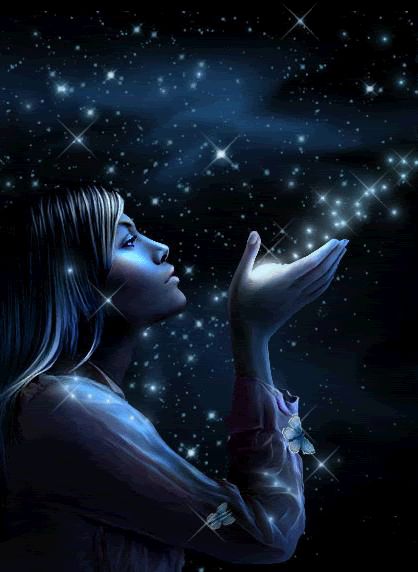
Dr. Bernardo Kastrup: "Reality is an excitation of consciousness."
|
refusing to become someone’s enemy

My favorite scene in the whole Stargate series was Lya of "The Nox," like a Spirit Guide, coming to offer wisdom and protection.
Don't let the unsolved hairdos of The Nox fool you. Ultra-sophisticated, The Nox's schtick, just to throw you off, is to pose as primitive forest-dwellers.
But, in fact, they're one of the most advanced civilizations across the cosmos, with not only floating cities but cloaked floating cities.
Lya's pretty good at making a lot of things disappear -- weapons of soldiers, entire spaceships, turning people invisible and transporting them; and she'll help anyone. The Nox live by a strict code of nonviolence. When push-comes-to-shove, however, it's true they will help the "good guys," but, the annoying part is, they'll also help "the bad guys."
Little wonder then that even the battle-hardened Col. Jack O'Neill found himself gushing before the high-order morality and sentience of The Nox: "God, I love those people!"
READ MORE
|
Frederic W. H. Myers, in the afterlife, transmitted to Juliet S. Goodenow, Vanishing Night: “You [shall] find whatever you search after. In all the category of experience, you gain what you are searching after — in literature, in art, knowledge, science, invention, love-attainment, in culture, wisdom, riches or treasure… All is accorded you. The spiritual embodiment of your life work is your treasure in Heaven, those laid up by yourself [that is, what you have made of yourself, reflecting your particular talents], your treasures, your mansion, your reward for all you have done on the Earth Plane is laid up by yourself, for yourself, when at last you attain your reward for deeds done in the body. No arbitrary avenging angel awaits you. Creation afforded you in the beginning the implements of industrious labor to satisfy the craving of hunger of the body, and for the satisfaction of the soul. Within your complex organism the Creator placed a guide [that is, your particular desire and sentiment, which reveal destiny] — your passport through the world and through eternity.”
in search of a metaparadigm
A metaparadigm is a transcending, overarching life-philosophy providing mental framework for all of one’s deepest beliefs, sensations, and aspirations. It gives coherence, direction, and purpose to everything.
It seems that we’re constitutionally required to search for a metaparadigm; without meaning and purpose in our lives, as Dr. Frankl instructs, we suffer "existential crisis" and drift into insanity.
When we’re young, if loving parents are part of our lives, we bask in a mantle of security they provide and feel that this comforting happiness will always sustain us; a young person, too, often believes that a favorite pet, or play-activity, or dessert is the answer.
As we grow older, we realize that we need more and begin to look for salvation farther afield: academic success, prospective career emolument, sexual pleasure in a John-and-Mary relationship, fame and investments, food and drink, and entertainment.
For some, meaning is sought in religion, secular philosophy, good works, personal development, or various expressions of materialism.
spurious metaphysical assumptions
All of these, as attempted personal metaparadigms, as the months and years pass, begin to fail us. We hope for something more. Even if we present to the world a positive demeanor (see the "Friendship" article), deeper within we grow increasingly dissatisfied with mortal existence. Nothing, for very long, seems to fill the “holes in the heart.”
In science, a “theory of everything” may initially appear to address all of the facts; but then, over time, cracks in the theory manifest as new data clashes with the old theoretical structure. A classic example is Newtonian physics. In its day, Newton’s “laws" were claimed to be the final word, even, it was said, the mind of God, concerning the way the universe works. But, eventually, as more was learned, it wasn’t enough. A broader, more comprehensive view of the cosmos was required to incorporate new findings. The need for a higher mountain's view gave us Einstein’s relativity and Bohr’s quantum mechanics. It’s not that Newtonian physics was wrong – it was, and still is, a “wonder of the world”; it got us to the Moon and back – it’s just that it was incomplete.
And so it is with our personal quest for meaning. Certain ideas and concepts work for a while in our lives, but then we grow beyond them and realize that formative notions were but stepping-stones to a greater vista.
the only thing worth knowing, 'what we stay alive for'
Can we ever know or inhabit a final level of metaparadigm? Does it exist? If it does, it will satisfy and address all human desires; will become, in itself, the sum of all human striving. Strangely, I think the answer, this ultimate reality, is already apprehended by all human beings. We sense its nearness; it haunts us in our 3 AM non-repressed moments. It is authentic, eternal, soul-based love.
I feel strongly that ultimate reality's meaning has something to do with authentic love - as Viktor Frankl and Elizabeth Barrett, above, sensed the same - but I haven't been able to get beyond initial intuitive glimpses. Recently, however, I believe I've seen a little more.
your homework assignment
In my article, "Will You Survive the Terror of Eternal Life?," I discuss a principle concerning the nature of the afterlife which is directly related to the subject of "ultimate reality." You may find it helpful to read this earlier writing as prelude to the following.
Allow me to frame the essential issue as it relates to the subject of "ultimate reality."
For our purposes, there are two well-respected sources of afterlife-information, both on the other side; one is Father Benson, the other a revered Spirit Guide, whose name I will not mention right now.
Both of these respected teachers, from whom I've learned a great deal, speak of the highest levels of reality - the very highest, just a notch below God him/herself, with no room in the middle.
But here's the issue. These two sources offer radically different views of that highest level. The difference is not small - the gap couldn't be much wider.
This is a serious problem.
How to make sense of this anomaly? We know, we have very good evidence, that both of these sources, two teachers, actually exist on the other side. Both are reporting what they see and what they know - and yet they're seeing different things. It's all the more confusing when we're talking about the "highest level of reality." Presumably, there can be only one "highest level."
Or not -- because, what if we can build our own "highest level"?
whole worlds created by the power of the mind
Here's what seems to be the situation.
Beginning in Summerland, but especially in subsequent worlds, it is well established that we will be able to create environment with our minds; even, whole worlds coming into being by the power of thought.
This is amazing enough, but consider this. People over there who share a certain philosophy of life might enter into a "consensus reality" form of living; those of another way of looking at life will inhabit their own. Think of two branches on a tree, each issuing from the main trunk. The two "consensus realities" are like two separate branches from the trunk, which never meet or cross each other.
Editor's note: Different philosophical groups in Summerland are called "brotherhoods." There are thousands of them. Each has a different idea on how to live successfully. I discuss this concept in The Wedding Song. The "Troubadour Guides" represent one such "brotherhood" group.
I think this is what's happening with these radically different views of "highest levels." These "worlds" are mind-created, sustained by those of similar philosophy and outlook. But if you yourself have a different way of looking at life and the universe, you'll never be in those other worlds -- you'll be on another "branch of the tree," your own branch.
I'm fairly confident that what I say here is true because, one thing I do know for sure, Father Benson and the other respected Spirit Guide disagree on certain aspects concerning how life should be lived. Both are good people, both want the best, and they both teach good things - that is, as each perceives "the good." The fact remains, however, on some things, some pretty important things, they disagree. And that disagreement, a philosophical parting of ways, as we extend each path to its logical conclusion, eventually results in radically different manifestations of "ultimate reality."
One of these "highest levels," I believe to be terribly amiss and wholly off-course. You wouldn't want to live there, not if you're of balanced mind.
Father Benson, as I will argue, offers the sane and rational view of the future and highest reality. There's nothing strange about it, nothing that wouldn't seem right to us; that is, if we're living from the "true self" -- and this is the fundamental difference between these two teachers and their two philosophies of life. See further discussion in "The 500 Testimonies from the Other Side."
I believe Viktor Frankl and Elizabeth Barrett were correct. Love is the highest reality. What does this mean?
It means an infinite array of good things, sane and rational things, all stemming from the sane and rational love in our hearts and minds, manifesting eventually, as whole worlds -- all founded upon the "true self," the hidden person of the heart.
Unless we build our spirituality on a perception of "the true self," eventually, even though we might talk a great deal about service and helping others, we will construct a world of insanity, a dystopian-reality, that diminishes human dignity.

|
Editor’s note: Thucydides’ History of the Peloponnesian War even today is studied in military colleges. The Greek historian was the first to apply scientific analysis to the events of the world rather than attributing outcomes to “the gods.” His realistic view of human nature renders his writing more than a “period piece” but timeless literature.
I like Friedrich Nietzsche’s evaluation of Thucydides:
“His writings must be carefully studied line by line, and his unuttered thoughts must be read as distinctly as what he actually says. There are few thinkers so rich in unuttered thoughts... It is courage in the face of reality that distinguishes such natures as Thucydides from Plato: Plato is a coward in the face of reality - consequently he takes refuge in the ideal: Thucydides is a master of himself - consequently he is able to master life.”
“Courage in the face of reality” dominates Thucydides’ writings. We are reminded of Tolle’s often-advice regarding accepting the present moment [that is, facing life without hostility, as we work to change what we don’t like]. But Nietzsche’s use of the word “coward” goes further. The German philosopher is saying that “The Republic,” a dystopian world of totalitarianism, represents taking “refuge in the ideal” -- nothing wrong with an ideal society, and we’d love to work toward one, as long as it’s based on a realistic assessment of human nature.
Plato, unlike Thucydides, fails us here. Tolle says that a refusal to accept the reality of the present moment leads us into insanity, an insistence on viewing the world in terms of what it can never be. Nietzsche labels this a form of intellectual cowardness, a pie-in-the sky wishful thinking, an unauthorized escape from unpleasant circumstance by taking refuge in fanciful ideal, one in which Plato imagined himself residing as an elite member. This unwarranted estimation of oneself, at the expense of others, is the essence of totalitarianism.
|
|
every angel is terrible...
“For beauty is nothing but the beginning of terror which we are barely able to endure, and it amazes us so, because it serenely disdains to destroy us. Every angel is terrible.” Rainer Maria Rilke, First Duino Elegy
Editor’s note: "Duino" is the name of a castle in Italy where Rilke, after hearing a voice as he walked near the Adriatic cliffs, began writing his Elegies. The whispering voice, whose testimony would become the first line of the lamenting poems, proclaimed, "Who, if I cried out, would hear me among the hierarchies of angels?" Severe depression would interrupt his writing, to be completed rather quickly some years later in a "boundless storm, a hurricane of the spirit."
Rilke, in the Elegies, it seems to me, endeavored to communicate a personal vision of love as ultimate reality. "Angels," for him, represented a transcendental expression of beauty, a higher reality, unattainable to man, he seems to think, while on the Earth-plane. Occasionally, we might catch a glimpse, but even a fleeting insight terrifies us.
Man's encounter, indeed, a confrontation, with existential Beauty underlies our loneliness and separateness, our striving toward, our inability to substantially access, the divine, while in this world. Rilke perceived a unity among life, love, and death, in that, true lovers will not be able to touch ultimate love while hampered by mortality: "the nature of every ultimate love ... is only able to reach the loved one in the infinite."
"Every angel is terrible [and] the beginning of terror." Not without reason men truly in love cannot sometimes breathe or speak in the presence of a Beloved as she symbolizes Beauty Personified. Her "made in the image" status, as we've discussed, conveys to him a nearness to God that shall not be superseded in this life or, likely, the next. This "terrible" ensign of God's perfect essence becomes all the divinity he is able to bear; yes, "every angel is terrible" as she "serenely disdains to destroy" him, both with presence and absence. There is reason why a man truly in love finds himself compelled to "worship and adore" his beloved.
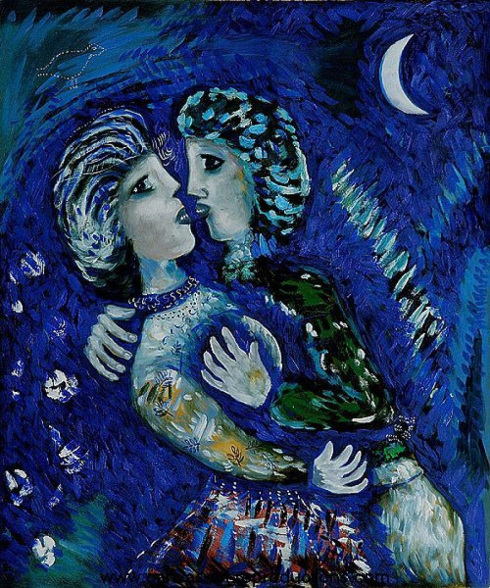
Marc Chagall, Lovers with Half Moon, 1926
|
|
ultimate reality as 'a bride adorned for her husband'
One misconception, I think, in defining ultimate reality is that we might tend to see it as a place, a destination of travel, some three-dimensional port-of-call. I believe that ultimate reality is more a state of consciousness than a place for unpacking a suitcase.
I asked my friend, Adrian Smith, JD, to offer discussion on this great question: What is ultimate reality and does love have anything to do with it? Here is Adrian’s insightful response:
We human beings are not very good at figuring out what is real. Whatever signals are out there pass through many layers and filters of prior conditioning, tradition, prejudice, and emotional compulsion.
Long before quantum mechanics, the German philosopher Husserl said that “All perception is a gamble.” We think we are looking at the world the way it really exists, rather than our own interpretation of it. In philosophy this is called “naive realism.”
Naive realism is responsible for all kinds of fundamentalist ideologies which, taken to an extreme, can cause people to murder each other; other people, however, are not necessarily so perverse or lying or insane, they just perceive the world differently, and once you realize that your own perceptions are gambles you will be more inclined towards understanding this in others.
Different people reading the same book will interpret it differently, although the book remains the same. There will be as many interpretations as there are readers.
There’s a well known Sufi story from the 12th century about a group of blind people trying to figure out what an elephant is. One person would feel the ear and say it’s like a velvet carpet; another would feel the trunk and say no, it’s a hollow pipe; yet another would feel the leg and say it’s a pillar - but no one has the vantage point to see the whole elephant. The totality of experience is never accessible. In the words of the apostle Paul, “we know in part” (I Cor 13:9). Somewhere there exists a whole elephant, but even the rigorously applied scientific method, the burdens and standards of proof in law and the rules of evidence in court, are limited by human fallibility...
What does the ultimate resolution of our painful dilemma look like? It resembles "a bride adorned for her husband.” The ultimate reality, in the view of the writer of Revelation, is “the tabernacle of God with men, and he will dwell with them” (Rev 21). The experience of romantic love most closely resembles that ultimate reality.
In the end, ultimate reality is not a doctrine or an understanding -- it is an ecstatic state.
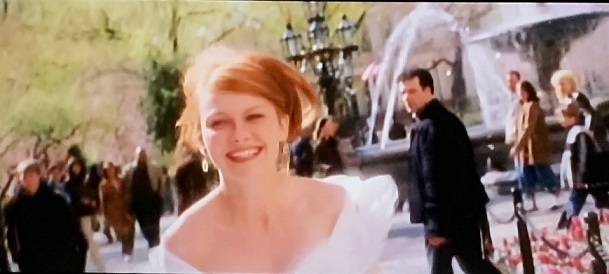
Editor’s note: I count Adrian’s perceptions here as some of the most important on the Word Gems site. The metaphor of ultimate reality as “a bride adorned for her husband,” I think, is mesmerizingly laden with meaning for us.
In the “Aloneness” article I commented that the apostle Paul employed the Greek word for the “holy of holies” of the ancient Tabernacle to signify the human mind, that is, the place where we meet God. So, too, Revelation 21 selects similar imagery.
Notice in Rev. 21:22, in the eschatological ["final goal" of things], metaphoric city of God, the symbol for ultimate reality – a city “adorned as a bride for her husband” – there is no temple; this is so because the entire city has become a temple, that is, a “holy of holies”; meaning, a day is coming when people will not “go to a temple” or “go to church” to meet God; instead, God will be one with us, close to us, everywhere and in every way.
We will meet God in a ubiquitous way, with “the entire city as our meeting place,” that is, everything we do and see and live will be our meeting place with God. This will come to pass via an elevated level of consciousness, an enlightenment, an evolved new state of humanity, such that, each will "meet God" within the "holy of holies" of one's own mind.
This omnipresent way of meeting with God is like “a bride adorned for her husband.” Ultimate reality, having God very near to our spirits and hearts, John says, is mind-bendingly wonderful, creating for us an ecstasy. It can only be compared to pure, sacred, Twin Soul, romantic love.
|
|
I think Adrian is correct when he says that ultimate reality is an “ecstasy.” And I think I was right, earlier, to say that ultimate reality is not a place, a 3-D destination, but a level of consciousness.
Ultimate reality is not, as some on the other side errantly suggest, a “hot water-bottle” world, a mere comfort world, of prettier flowers and greener grass.
But this notion of "prettier flowers and greener grass" just confuses the issue. Ultimate reality has nothing to do with eco-friendly stage-props or pleasant venue; if I were mature and advanced enough, I could experience "ultimate reality" while walking downtown in a busy city.
|
we might wonder, 'will I ever feel good again after the sorrows of this earth, many times I feel so bad I can't even remember what it's like to feel good'
In a channeled comment from the other side, a spirit person said that life in our world is like “living in a war zone.”
Sometimes we can feel so bad that we might despair of ever feeling good again.
In the book of Revelation there are many indecipherable symbols with complete explanation to elude us; but one thing becomes clear: the writer attempts to provide answer to the universal question, how will evil, pain, and sorrow finally be expunged from the Earth?
However, I would suggest that Revelation’s solution will not come as total cleansing of the Earth but only to one individual at a time. I say this because of the references to the “holy of holies” of the mind – which could never be offered en masse.
Editor’s note: In Rev. 21 the Greek for “holy” or “holy city” is elsewhere translated as “holy of holies,” that special part of the temple wherein the high priest purportedly met with God; also, this word is sometimes used by Paul to describe the sanctified and spiritually enlightened mind. See illustrations of the temple here. I think it is clear that the writer of Revelation would have us understand that a day is coming when each of us shall enjoy personal and substantial union with God. The entire “holy city” is seen as a temple, or a “holy of holies,” meaning, one’s entire life will become an expression of union with God. And how shall this come to be in a practical sense?
We are told that our rescue from the “war zone” that is planet Earth will manifest via an immersion into complete union with God – that is, the temple of God shall be everywhere.
And how shall we meet or come into union with this God? – by round-the-clock “praise and worship” and hymn singing? Oh, no, none of that stifling miasma of religious orthodoxy. Then how? – by communing with God’s special agent and representative, God’s own “image”; in well matched reciprocity, each for the other, to love, to offer happiness, to provide darling companionship, for all times to come.
the beautiful and perfect bride, man's eternal salvation
The writer of Revelation metaphorically presents the solution, the healing balm, concerning all poisonous and vicious elements of the world, in the form of a beautiful “bride adorned for her husband.” This is an astonishing picture of individualized receipt of extreme delight!
One’s Twin Soul romantic mate becomes salvation to us in a very custom-crafted and personalized manner.
|
the most important concept on the Word Gems site
One of my favorite essays is “What we stay alive for.” This is the crux of the matter. We need to come alive, which is primary importance, but, once alive, we need a reason to stay alive. In the writing “500 tape-recorded messages from the other side” we learn of a vast class of people over there who have not yet found their reason to live; as such, they drift into various levels of insanity.
On the “Prologue” page of “The Wedding Song” we are reviewing various testimonies speaking to the reality of Twin Souls. The mystic Omraam Mikhael Aivanhov, however, better than others, intuitively grasped the sense of importance to be accorded Twin love as vital component of the spiritual mind of wisdom.
“The soul ... is itself only one-half of a complete being. For each of us there is a counterpartal [person] of the opposite polarity. And our pilgrimage towards emancipation [from illusion] consists in drawing ever nearer to this balancing factor ... so that, in the end, [while retaining sacred individuality,] we become [effectively One Person,] a male-female being in whom the positive and negative forces are in perfect equilibrium, reflecting the nature of the Male-Female Creator. Only through the perfect union of two souls of the opposite sex can that blending of forces be achieved which brings freedom from illusion and the full experience of Reality.”
Aivanhov gets it exactly right. It’s only through the union of destined Twins that a complete “freedom from illusion and full experience of Reality” might be achieved. Notice the emphasis. We might have expected to hear of "a complete happiness" but instead "a complete freedom from illusion" is presented as central concept.

Why is Twin Soul love the doorway to ultimate wisdom, evolvement, and spiritual vision? - because it reflects the highest expression of ultimate reality, the subsuming influence and dominion of Mother-Father God.
The concept of “highest reality” brings to mind once again “the 500 tape-recordings from the other side.” Among these one finds the occasional testimony from those who were famous during their Earth sojourn; accomplished individuals – scientists, statesmen, and the like – they continue some of their work in Summerland.
However, concerning their personal lives, many of these did not live moralistically, and as they spoke one discerned that this attitude of using others for one’s private pleasure had not yet been expunged from their spirits. There was a certain “hollowness” and “brittleness” to their viewpoint.
Despite great accomplishments, one is left with an impression that they had not yet met “ultimate reality”, were still quite materialistic in their thinking. And this is what Omraam Mikhael Aivanhov is getting at when he says that true love is the doorway to freedom from illusion, an illusion of materialistic perspective; instead, authentic romance becomes portal to full experience of highest wisdom.
It would have to be this way as true love is not only part of the divine mind but reflects the highest domain of "what is" - the dual female-male energies - a closer attunement with, the hegemonic and "singular pervasive" reality that is, Mother-Father God. There is reason why ancient Spirit Guides refer to divinity in this manner.
See a 5-part writing on "Freedom From Illusion."
'you have not come to the arctic regions, you cannot be perfected without it'
Troubadour Spirit-Guide Margaret: “[Twin Soul] love is the atmosphere of this life [in Summerland]. You have not come to the arctic regions, but to the region where [romantic] love is a pervading influence, warming all hearts. No spirit can find its most perfect development who misses from his life the experience which [romantic] love can give him. If he has lived a loveless life on Earth, the possibility is still reserved for him here. The certainty will come to him in the future. His being cannot be perfected without it.”
|
|
never so free and awakened as when in love

In The Matrix: Resurrections Trinity reawakens to Neo, and to the deception of The Matrix, by the power of love. In an earlier incarnation, Persephone had claimed “It’s just a kiss”; for her this was true, but not for the authentic version.
Like Snow White reviving with the kiss of the Prince, there is a force within true love which terrifies totalitarian structures. It is quite right to say: people are never so free, never so in tune with their own sense of dignity and destiny, and never so likely to leave cultish organizations, as when they're in love.
The memory trace of true love touched something very deep within Trinity and Neo. It reconnected them, not only with each other but, with their authentic selves, a primal affinity which had been crushed by totalitarian element. Suddenly they see the world as something new, as it truly is, a world making way for romantic relationship as ultimate reality.
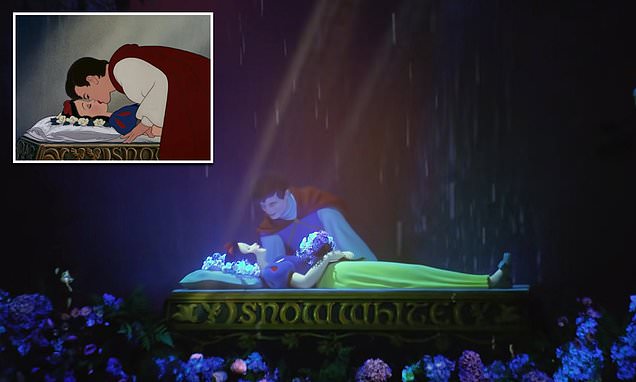
|
|
Can a mystical experience be invited?

K. I received one of those “flashes” of insight today.
E. I’d like to know.
K. When I tell you, it won’t seem like much, but I feel overwhelmed right now.
E. (silence)
K. I’d like what I say here to be brief, as so much could be said, but – I think it best if the reader thinks about this for his or her own life. However, what I have to say is about mystical experiences. And it suddenly came to me today that these "doves of insight" do not light upon us haphazardly. It seems to me, they always occur in conjunction with the furtherance of sacred destiny.
E. That would make sense, wouldn’t it.
K. For example, in life we have all sorts of milestones: we graduate from high school or college; John and Mary get married; their first child comes along. They enter a job or career. They move to some part of the country, and then maybe move again. We could go on listing the mile-markers of life. But it occurred to me – generally speaking, there are no mystical experiences associated with any of these.
E. To play devil’s advocate, John and Mary would say that their wedding day was pretty special, and the birth of their first child may have moved them even more deeply.
K. Yes, of course, but… for those of us who’ve had what they had, but then, maybe later during a time of “eyes wide open,” we know that the authentic mystical experience is much more.
E. What’s the real dividing line here?
K. I think it has to do with cosmic reality, not the temporary things of the Earth. For example, it’s very common for those about to leave this world to have deathbed visions of the next life. But, Elenchus, from my own experience – which seems to be especially accosting my spirit today – I now see that even the deathbed vistas have to be classified as “secondary” mystical experiences (ME). The really big ones in life have to do – is it such a mystery? – with the eternal love and marriage.
E. (silence)
K. On these many pages in WG, we have discussed our mystical experiences. And none of them, not one, fall into a mundane category of the sort listed a minute ago relating to John and Mary. All of them impinged upon the eternal romance of Twin Souls.
E. I know you are correct, but, as I listen to you just now, it becomes clear that our MEs were course corrections. We didn’t necessarily want them. Often, we fought them. And then spent years trying to run from and bury them. But, like a river that cannot be tamed or diverted, the MEs would have their way, and brought us to where we are today.
K. Doubtless, they’re not finished with us. We’re still very much a raw product.
E. And now people will want to ask you, how can they have these MEs?
K. It’s difficult. While the eternal love and marriage awaits all of us, the timetable will vary.
E. Vary with what?
K. One’s inner readiness, or level of maturity, I suppose. It’s the soul’s call, not ours.
E. But we weren’t so mature.
K. Hardly at all – so there goes that theory. But, even so, a Universal Intelligence, the One who designs our lives for optimal happiness, makes those decisions. And we’re not often asked if it’s convenient. But, to offer some sort of answer to those who are keen to know, all I can say is - learn how to open one’s mind and spirit to Source, that we might be directed.
|
|
there is a hidden reality, unperceived by the five senses, Krishnamuti called it 'the immensity' or 'the state of creation itself' or 'that which is beyond the mind'; in each of his 1000+ lectures, directly or indirectly, he refers to this realm of ultimate truth
Kant was on to this 250 years ago. He used terms like “phenomena,” things as mere appearances, images in the mind, not real in themselves; and “noumena,” things in themselves, as they truly are, the actual essence of reality.
With common human sensibilities, said Kant, we can never know the noumena but only phenomena. Professor Kant instructed that space and time, grand examples, are merely representations of the mind, have no existence independent of human perception.
Over 100 years later, Einstein made all of this famous with his pronouncements on the “space-time continuum.” It’s not made of space, not made of time, not a combination of the two, but an underlying matrix of reality, something unknowable to us, giving rise to what we merely perceive as space and time.
The noted physicist David Bohm, too, posited "the implicate order" as the unseen spawning ground of visible reality.
Only several years after Einstein published his 1915 paper on General Relativity, Krishnamurti began to speak of 'the immensity' or 'the state of creation itself' or 'that which is beyond the mind'.
if you understand this, then you’ll see what K is trying to put forward
Almost everyone is unaware of the hidden reality. So many of us are materialists, and do not truly accept the existence of an unseen spiritual realm.
The five senses cannot access it. In fact, the thinking mind itself gets in the way. We have to learn how to shut down or circumvent the censoring apparatus of the physically-oriented brain. We want this because ultimate reality is a domain offering a higher level of intelligence, far beyond that of rationality and logic.
These, of course, have their place; with them, we can build bridges and skyscrapers, make poetry and paintings, go to the Moon and Mars; and, while all this is good, the thinking mind short-circuits the process of accessing “the immeasurable.” It doesn't work for that.
Krishnamurti’s lectures tell us how to get to where we need to go.
The good news is that we were made to apprehend this higher dimension. We can do this. We just need to learn how to upgrade our software.
Special note: A Kairissi-and-Elenchus dialogue has been created to explore "the immensity" in relation to authentic romantic love.
READ MORE
|
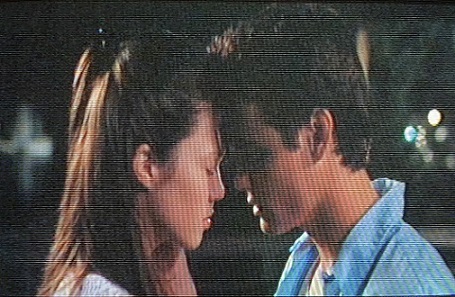
|
The Dazzling Darkness is a concept representing a frame of mind untrammeled by the dysfunctional ego. Therein, freed from base-alloy lower-nature inclinations, one might apprehend not only the identity of one’s true mate but also a realization of the living presence of God in one’s life. READ MORE
|
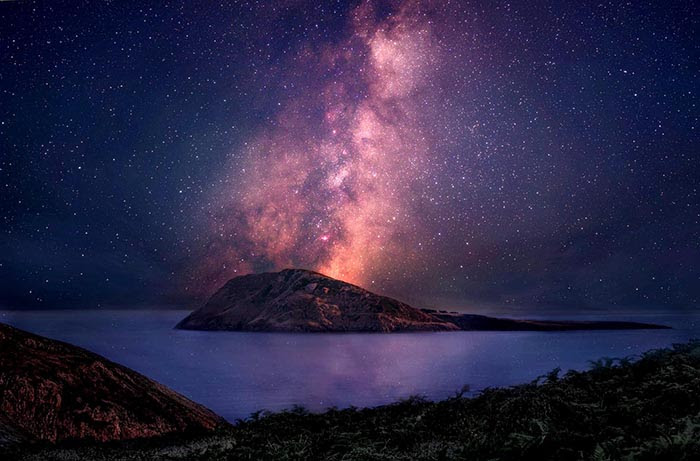
|









